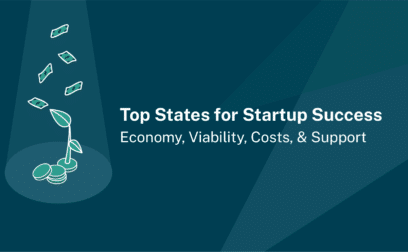TABLE OF CONTENTS
North Carolina has a thriving business community and is consistently ranked highly for business in the U.S. If you’re looking to start or expand a business, North Carolina is clearly a great choice. But getting your idea off the ground usually means finding funding.
Explore small business loans in North Carolina, as well as how to apply and alternative funding sources.
If you’re looking for financing for a small business in North Carolina, the first place you may look is a business loan. There are a variety of types of loans available to small businesses in North Carolina, including:
Every business loan program and lender will have their own qualifications, application processes and terms, so it’s important to research each option to make sure they meet your business needs. Swoop can help you figure out which options are best for you based on your qualifications and business requirements.
Another popular business financing option is a business grant which provides your business with money that you don’t have to pay back. Many nonprofit organizations and business incubators will offer business grants to contest winners, while other grants are available through economic development programs or government agencies.
Start by checking government programs at the federal, state and local levels. The U.S. Small Business Administration (SBA) and the North Carolina Department of Commerce are good starting points.
Research nonprofit organizations, industry associations and foundations that may provide grants to businesses, especially those within your industry or business focus. Local economic development agencies and chambers of commerce can also be valuable resources, offering information on available grants and assistance programs.
Online platforms and databases that collect grant opportunities can help streamline your search. Websites such as Grants.gov, the North Carolina Rural Center and local community foundations often list available grants and provide details on eligibility criteria and application processes.
Networking within the local business community can also be beneficial. Attend business events, workshops, and seminars to connect with other business owners who may have insights into available grants or funding opportunities.
Prepare a well-crafted grant proposal that clearly outlines your business’s goals, the intended use of funds, and the potential impact of the grant on your business. Remember that securing a business grant can be competitive, so persistence and thorough research are key.
Being prepared for your business loan application can save you a lot of time (and help you get your money faster). While every loan program will have its own application process, you can generally expect to follow these steps to apply for a business loan in North Carolina:
Remember that every lender will have their own loan application and approval processes, as well as terms, conditions and qualifications. Preparation and communication are key to getting the funding you need as quickly as possible.
Your credit score is one of the most important factors a lender will look at when considering whether to give you a loan. There’s not a single credit score that can ensure you are approved for a loan, but higher credit scores (700 or above) tend to help show lenders that you’re creditworthy (able to pay back a loan). A higher credit score also gives you leverage when negotiating interest rates and terms.
Some SBA loan programs may accept credit scores between 650-680, although you may have to provide a downpayment, collateral or a personal guarantee. Online or alternative lenders are often willing to lend to borrowers with lower credit scores (550-650), but they will usually have higher interest rates and shorter repayment terms to make up for the risk.
Remember that lenders will also consider other factors, such as your business plan, annual revenue or collateral, when considering whether or not to lend to you. You can also work on building your credit score before applying for a loan to help ensure you get the best possible rates and terms.
Interest rates vary due to the lender, the borrower’s qualifications, the type of loan and general economic conditions. The average traditional business loan in the U.S. had an interest rate between 5.75% and 12% in 2023, while online loans fell between 7% and 60% (with some alternative loans offering even higher rates). SBA Loans are tied to the U.S. Prime rate and averaged 11.5% to 16.5% in 2023, depending on the loan program and amount of the loan. Some loans also come with fixed interest rates while others have variable interest rates. Always check with your lender and review your loan approval documentation to make sure you understand what your interest rate is and how it could change.
The amount of time it takes for loan funds to reach your account depends on the type of loan, amount of the loan and the lender’s application and approval processes. For traditional bank loans, you can expect to wait a few weeks after applying to see the funds, but you may have to wait longer if you have to respond to requests for more information. SBA loans tend to have longer approval and review processes, and can take anywhere from six weeks to six months to fund. Online and alternative loans often boast short application processes and quick approval times – sometimes as quickly as two business days. Always consider how long you can wait to receive your funds before you apply for a business loan or other funding.
If you’re not ready to apply for a business loan, need funds faster or aren’t sure you qualify, there are a number of other funding options available for small businesses in North Carolina.
You may choose to use one or several of these funding methods to help your business grow, but make sure you understand interest rates and fees before you sign anything.
Finding the best funding for your business in North Carolina doesn’t have to be overwhelming. Preparation and strategy will go a long way in helping you find the money you need to make your business succeed.
Research and explore the various funding options available in North Carolina. Understand your business’s eligibility for different funding sources, including your credit history, time in business and financial health. Each lender or program may have specific criteria, and understanding what you qualify for can help you narrow your search.
Networking within the local business community can also be beneficial. Attend business events, workshops, and seminars to connect with other business owners who may have insights into available grants or funding opportunities.
Consult with financial advisors or small business development centers in North Carolina. They can provide guidance on finding and applying for business loans, offering support and expertise throughout the process.
Remember to compare the terms, interest rates, and fees associated with different funding options. Look beyond the surface and consider the overall impact on your business’s financial health.
Ultimately, the best funding option for your small business in North Carolina will depend on a combination of factors, including your business’s financial situation, goals, and the specific requirements of the lender.
Find funding for your small business in North Carolina with help from Swoop. We offer a wide range of funding options and resources to support your business, and we guide you throughout the process. Get started today.
Daire made it happen! There is no doubt that Swoop sped up the process and found lenders that worked to our time scale rather than the other way round
Hocque Figureoa
Joint owner, F45 Virginia
Swoop was actually very helpful in helping us get our initial fundraising in place. Swoop was able to connect us with investors, with grant financing options and debt financing options.
Viler Lika
Founder, SingleKey
Pedja was amazing. Super supportive, understanding of our needs and wasn't pushy at all. We've been going back and forth with Swoop for over a year inquiring about different financing options and they were patient until we were ready!
Chris Skeates
F45 Multi-studio owner
Join the 95,000+ businesses just like yours getting the Swoop newsletter.
Free. No spam. Opt out whenever you like.
Kingfisher Way, Silverlink Business Park, Newcastle upon Tyne, NE28 9NX, UK
View in Google Maps35 Bull Street, Lewis Building, Birmingham B4 6AF, UK
View in Google MapsAberystwyth Innovation and Enterprise Campus
Gogerddan Campus
Aberystwyth University
Ceredigion
SY23 3EE
Dogpatch Labs, The CHQ Building, Custom House Quay, Dublin, Ireland
View in Google MapsSuite 801, Level 8, 84 Pitt Street, Sydney, NSW 2000, Australia
View in Google Maps43 W 23rd St, New York, NY 10010, United States
View in Google Maps21 Dreyer Street, Cape Town, South Africa, 7708
View in Google MapsClever finance tips and the latest news
Delivered to your inbox monthly
Join the 95,000+ businesses just like yours getting the Swoop newsletter. Free. No spam. Opt out whenever you like.




